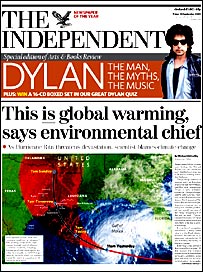Be Careful What You Wish For
August 4th, 2006Posted by: Roger Pielke, Jr.
Democrats on the House Science Committee have been trying to get the Technology Administration in the Department of Commerce to release a report that Congress had requested and paid for on the impact of “outsourcing” on U.S. science and technology jobs. For some unknown reason, whether hardball politics or simply incompetence, Secretary Carlos Gutierrez ignored requests for release of the study, which was to be delivered in 2004.
Finally a few weeks ago, Science Committee Democrats were able to get the report they had been seeking, and have posted excerpts on their website. What does it contain that DOC or the Administration might want to hide? Not much.
My reading of the report finds the following two statements to be the most interesting, because they are counter to claims of a looming outsourcing crisis:
The effect of offshoring on the competitiveness of the US IT services and software sector appears to be negilible . . .
The present outsourcing and offshoring trends will increase the competitiveness of the U.S. semiconductor industry in the short term . . .
So what gives? The DOC report does provide some strong counter-evidence to the claims of an outsourcing crisis presented in the NRC report Rising Above the Gathering Storm, which has been used in support of a bipartisan push for more science and engineering funding in the name of competitiveness. Maybe the DOC report was being sat on so as not to provide a mixed message on competitiveness. After all, running on the issue of foreigners taking “our” jobs sounds pretty appealing. But I am skeptical about this explanation. After all, Democrats as well as Republicans like to run on the jobs issue and the DOC report doesn’t exactly help the Democrats cause (they clearly were looking for evidence that the Administration was hiding evidence of a mass exodus of jobs overseas). And surely there are also behind-the-scenes politics going on that may trump this explanation.
In any case, the Science Committee Democrats are to be applauded for wrestling the report that they paid for out of DOC. However, in the end it provides little help to their cause, and in fact contains data at odds to the recent bipartisan push on addressing U.S. competitiveness through more funding for research. It also suggests that the crisis in offshoring is not as bad as advertised, but this is a result not being told by either party.
